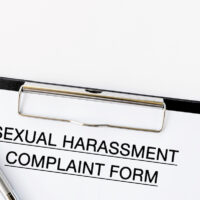Victim’s Rejection Of Harasser’s Sexual Advances Shows Sexual Harassment Was Unwanted

For more than two decades, our Alachua County, Florida sexual harassment lawyers have represented Florida employees who have been required to work in a sexually hostile work environment. Through their extensive experience representing sexual harassment victims, our Gainesville, Florida sexual harassment attorneys know that employees often defend sexual harassment cases by claiming that the victim welcomed the sexual harassment. To prevail on a claim of sexual harassment, the behavior at issue must be unwelcome in that the victim neither solicited it nor invited it and regarded the conduct as undesirable or offensive. Pointing to various actions of the victim considered in isolation, employers maintain that the victim either contributed to or welcomed the sexual behavior. In this article, our Alachua County, Florida sexual harassment lawyers explain how the decision in Moore v. U.S. Virgin Island Dep’t of Tourism, Case No. 14-cv-0081 (D. V.I. Aug. 31, 2020) demonstrates that an employer’s attempt to portray the victim’s behavior as an indicator of welcomeness, at best, raises a question for the jury as to whether the victim considered the harasser’s conduct to be unwelcome.
Sexually Hostile Work Environment Alleged
In that case, Melba Moore (Moore) brought a sexual harassment lawsuit against her former employer, U.S. Virgin Islands Department of Tourism (the Department), pursuant to Title VII of the Civil Rights Act of 1964 (Title VII). Title VII prohibits sexual harassment that is sufficiently severe or pervasive to alter the conditions of the victim’s employment and create an abusive working environment. Moore claims that the Department violated Title VII by requiring her to work in a sexually hostile work environment.
In November 2012, the man who would become Moore’s supervisor, Milligan, interviewed Moore for a job at the Department. Moore was not hired, but after the interview, Moore asserts that Milligan began sending her messages via Facebook asking if she would visit him because he was “lonely.” Moore rebuffed Milligan’s requests. In April 2013, Moore ran into Milligan while shopping and Milligan told her to come to and see him the next day at the Department, as he had a job for her. Milligan hired Moore as a welcome greeter the next day.
On September 25, 2013, after issues arose regarding Moore’s punctuality, Milligan gave Moore a formal written warning. On October 1, 2013, Milligan notified management that he was “still having issues with [Moore] constantly being late” and that he was recommending a three-day suspension. Moore then came forward with allegations that Milligan had sexually harassed her.
Milligan’s sexual behavior, according to Moore, included asking her to spend time with him, propositioning her for sex, and offering her money for sex. On one occasion, Moore alleges that Milligan came to her desk and asked if she had changed her mind about having sex with him, and that when she rebuffed him, he drew a dollar sign on a piece of paper, circled the dollar sign, wrote the words “no strings,” and then verbally asked her again for sex. The Department initiated an investigation into Moore’s complaint. At the end of the investigation, the investigator recommended annual sexual harassment training for managers. No action was taken against Milligan.
Victim Rejects Sexual Advances
The Department filed a motion with the trial court seeking dismissal of Moore’s sexual harassment claim. In doing so, the Department argued that Moore could not establish that Milligan’s alleged sexual behavior was unwelcome because she referred to Milligan as “hon” and invited him to her daughter’s birthday party after some of the alleged harassment occurred. The Department further relied on the testimony from an employee that he believed Milligan enjoyed the attention Milligan gave to her and that she was not offended by it. The trial court denied the Department’s motion for dismissal and ruled that Moore had produced sufficient evidence for a reasonable jury to find that she considered Milligan’s alleged sexual conduct unwelcome.
In denying the Department’s motion for dismissal, the trial court found that Moore’s testimony that “she repeatedly rebuffed” Milligan’s advances was sufficient to establish that she considered the sexual conduct unwelcome. In further support of its conclusion, the trial court also pointed out that Moore testified that Milligan’s “behavior made her uncomfortable, annoyed, disgusted, and appalled, and she never wanted to be near him.” The trial court also pointed out that Milligan’s alleged sexual conduct was properly deemed unwelcome because Moore was “bothered enough” by the behavior to report him.
In denying the Department’s motion for dismissal, the trial court also determined that the alleged reference to Milligan as “hon” and the invitation to her daughter’s birthday party “cannot be considered in isolation, but only together with all the other evidence.” When considered together with all the other evidence, the trial court found that the alleged reference to Milligan as “hon” and the invitation to the birthday party “are not such obvious indicators of welcomeness that no reasonable jury could find in favor of [Moore].” Consequently, the trial court concluded that the “evidence in support of [the Department’s] position raises a question for the jury as to whether [Moore] construed Milligan’s alleged conduct to be unwelcome.”
Gainesville, FL Lawyers For Sexual Harassment Victims
Based in Ocala, Florida and representing employees throughout Central Florida, our Alachua County, Florida sexual harassment attorneys have been fighting for the rights of sexual harassment victims for more than twenty years. If you have experienced sexual harassment in the workplace or have questions about your rights as a sexual harassment victim, please contact our office for a free consultation with our Gainesville, Florida sexual harassment lawyers. Our employment and labor law attorneys take sexual harassment cases cases on a contingency fee basis. This means that there are no attorney’s fees incurred unless there is a recovery and our attorney’s fees come solely from the monetary award that you recover.
